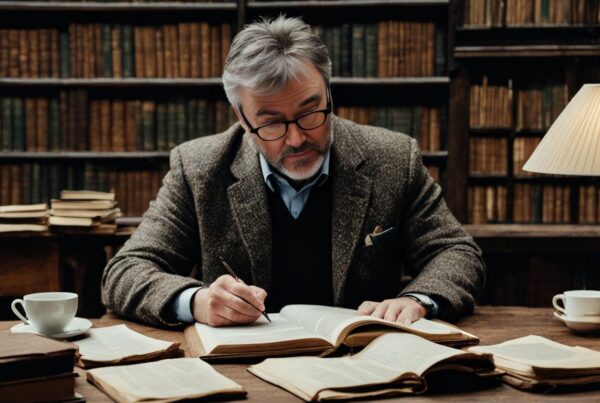If you’re looking for a thrilling dystopian novel that explores themes of beauty, identity, and conformity, look no further than Scott Westerfeld’s “Uglies.” And if you’re an audiobook fan, you’re in luck – the audiobook version of “Uglies” is a fantastic way to experience this captivating story.
In this section, we’ll dive into our review of the “Uglies” audiobook, exploring its strengths and weaknesses, and evaluating how it enhances or detracts from the overall experience of the novel. From the writing style to the narration quality, we’ll leave no stone unturned in our analysis.
So, buckle up and get ready to explore the world of “Uglies” in a whole new way.
Key Takeaways:
- “Uglies” is a thought-provoking dystopian novel that explores themes of beauty, identity, and conformity.
- The audiobook version of “Uglies” is an excellent way to experience this story, with high-quality narration and engaging production elements.
- Scott Westerfeld’s writing style is immersive and imaginative, drawing readers into a vividly realized world.
- The character development in “Uglies” is a standout element, with well-drawn and relatable protagonists.
- Overall, “Uglies” is a must-read (or must-listen) for fans of the dystopian genre, and the audiobook is a fantastic way to experience this captivating story.
Introduction to “Uglies” by Scott Westerfeld
Scott Westerfeld is a renowned author, best known for his young adult science fiction novels. His book “Uglies” was first published in 2005 and quickly became a cult classic among dystopian fans. The novel is set in a future society where everyone undergoes an operation at the age of sixteen, turning them into “pretties” with symmetrical faces and perfect bodies. The story follows the life of Tally Youngblood, a reluctant teenager who refuses to conform to society’s expectations.
“Uglies” explores the themes of beauty, conformity, and individuality. It takes a critical look at the societal pressure to conform to certain standards of appearance and behavior, and the consequences of doing so. Through the story of Tally and her friends, Westerfeld highlights the importance of self-discovery, critical thinking, and questioning the status quo.
The novel’s popularity has spawned three sequels, “Pretties,” “Specials,” and “Extras,” as well as a graphic novel series. It has also been adapted into multiple formats, including a stage play and a movie adaptation in development. In the following sections, we will dive deeper into the world of “Uglies,” examining its plot, characters, themes, and more.
Plot Summary
In the not-too-distant future, society values beauty above all else. In Scott Westerfeld’s “Uglies,” sixteen-year-old Tally Youngblood can’t wait to become pretty. In Tally’s world, everyone undergoes an operation that transforms them from an “ugly” to a “pretty” at the age of sixteen. But when Tally’s best friend Shay runs away to avoid the operation, Tally must make a choice: find Shay and turn her in or never become pretty herself.
In her search for Shay, Tally discovers a group of rebels fighting against the government’s operation, led by a boy named David. As Tally spends time with the group, she begins to see the ugliness beneath the surface of her society’s obsession with beauty. But when the government captures Tally, they force her to choose between betraying her new friends and the life she’s always wanted.
The plot of “Uglies” is full of action, suspense, and political intrigue. As Tally discovers the truth about her society, she must decide whether to follow the status quo or fight for what’s right. The story is set in a futuristic city and features a cast of well-developed characters, including Tally’s romantic interest, David, and her conflicted best friend, Shay.
Analysis of the Dystopian Society
Scott Westerfeld’s “Uglies” portrays a dystopian society, where the standard of beauty is the ultimate achievement. The society is obsessed with perfection and anyone who doesn’t conform to the ideal beauty standards is considered ugly and less worthy. In this section, we will analyze the different aspects of this dystopian society.
The Rules and Norms
The society in “Uglies” is governed by strict rules and norms that dictate how individuals should behave and look. The government controls every aspect of citizens’ lives, from what they wear to where they live. The society also employs surveillance technologies to monitor the citizens, ensuring adherence to regulations. This strict control ensures that everyone conforms to the ideal beauty standard, promoting a society that values conformity over individuality.
The Consequences
The obsession with perfection has grave consequences on the inhabitants of the society. The pursuit of beauty overshadows everything else, which leads to a lack of concern for other essential aspects of life, such as freedom and personal fulfillment. The society, plagued with conformity, creates a void where individuals don’t have an identity or a sense of purpose. The concept of beauty becomes a tool for suppression instead of a source of inspiration.

Analysis
The dystopian society portrayed in “Uglies” is a cautionary tale that emphasizes the dangers of an excessive focus on appearance over substance. Scott Westerfeld’s novel provides a unique perspective on how societal standards can lead to a homogenous society, where conformity is paramount. The dystopian society in “Uglies” serves as a reminder of the importance of individuality, personal freedom, and the value of diversity in society.
Character Development
One of the most notable aspects of “Uglies” is the exceptional character development throughout the story. Each character experiences growth and transformation that captivates the reader and keeps them invested in the outcome.
The protagonist, Tally, evolves from a naive and obedient citizen of the dystopian society to a rebellious individual fighting against the system. Her motivations shift as she gains new insights into the society’s flaws and begins to question the status quo.
Similarly, the supporting characters experience their own personal journeys. Shay, Tally’s best friend, initially rebels against the system but eventually comes to realize the importance of personal identity and freedom. David, a member of a rebel group, contends with his own past and motivations, ultimately leading to a greater understanding of himself and his purpose.
Scott Westerfeld skillfully depicts these characters’ inner struggles, providing insight into their motivations and conflicts. The reader is compelled to empathize with each character, making their growth and development all the more impactful.
The character development in “Uglies” is a testament to the skillful writing of Scott Westerfeld. It adds depth and meaning to the story, elevating it beyond a simple dystopian tale.
Writing Style and Narration
Scott Westerfeld’s writing style is both engaging and thought-provoking, drawing readers into the world of “Uglies” and keeping them hooked until the very end. His use of vivid, descriptive language paints a vivid picture of the dystopian society and the struggles faced by its inhabitants.
The audiobook version of “Uglies” is also well-narrated, with a talented voice actor bringing the characters and their emotions to life. The use of sound effects and music also helps to enhance the listening experience, immersing the audience in the world of the story.
Themes and Messages
Scott Westerfeld masterfully weaves several themes and messages throughout “Uglies” that offer insightful social commentary. One of the most significant themes is the impact of extreme societal standards on individuals. The society depicted in the book is obsessed with physical beauty and enforces strict conformity, causing individuals to lose their sense of self and worth beyond their appearance.
Another important theme is the importance of individuality and self-discovery. By challenging the status quo and embracing their unique qualities, the characters in “Uglies” learn to appreciate themselves and find a deeper sense of purpose. Westerfeld also highlights the dangers of conformity, showing how blindly following societal norms can lead to oppressive systems of control and a lack of personal agency.
Ultimately, “Uglies” serves as a cautionary tale about the pitfalls of an overly regulated society that prioritizes beauty over all else. Through its themes and messages, the book encourages readers to value individuality, question societal norms, and resist oppressive systems that seek to control and limit personal freedom.
Audiobook Performance
Scott Westerfeld’s “Uglies” audiobook version is an exceptional listening experience with its engaging narration and sound production. The audiobook, narrated by Emily Tremaine, is a remarkable take on the novel, bringing the characters to life with distinct voices and well-timed pauses. Tremaine’s performance throughout the audiobook is exceptional, consistently maintaining the listener’s attention and drawing them deeper into the story.
The use of sound production and music in the audiobook adds an extra dimension to the listening experience, immersing the listener further into the dystopian world of “Uglies.” The background score is fitting to the mood of each scene and further elevates the audiobook’s performance.
The audiobook performance makes “Uglies” more accessible to those who may not enjoy reading books and those who want to experience the story in a fresh and exciting way. Overall, the audiobook performance of “Uglies” enhances the listener’s experience, making it a must-listen for all audiobook fans.
Comparisons and Similar Works
As a highly regarded work in the dystopian genre, “Uglies” shares many similarities with other notable books in the same category. One such work is George Orwell’s “1984,” which also explores the concept of living in a rigid, controlling society where conformity and obedience to authority are emphasized. Another similar work is Ray Bradbury’s “Fahrenheit 451,” where the government controls information through censorship and book burning, much like how the society in “Uglies” enforces conformity through cosmetic surgery.
However, “Uglies” also has its unique aspects that set it apart from other dystopian works. Unlike many other books in this genre, “Uglies” portrays a society that is fixated on physical beauty and perfection, and how it affects the individual’s sense of self-worth. The book also explores the psychological effects of conformity and how it can lead to the suppression of individuality.
Comparison Table
| Title | Author | Similarities | Differences |
|---|---|---|---|
| 1984 | George Orwell | Controlled society, lack of individual freedom | Society not fixated on physical appearance |
| Fahrenheit 451 | Ray Bradbury | Censorship and control of information | Society not fixated on physical appearance |
| Brave New World | Aldous Huxley | Dystopian society with strict social hierarchy | Society not fixated on physical appearance |
The comparison table above highlights some of the key similarities and differences between “Uglies” and other notable dystopian books. While each work may have its unique aspects and themes, they ultimately share the overarching message of the dangers of oppressive, controlled societies and the importance of fighting for individuality and freedom.
Conclusion
In conclusion, Scott Westerfeld’s “Uglies” audiobook offers a compelling and thought-provoking story set in a fascinating dystopian society. The book’s themes of beauty, conformity, and individuality are relevant and relatable, making it a must-read for fans of the genre.
The character development in “Uglies” is impressive, with the main characters’ growth and transformations captivating the reader. Additionally, Westerfeld’s writing style and narration enhance the audiobook experience, bringing the story to life in a unique and engaging way.
While “Uglies” shares some similarities with other works in the dystopian genre, it still manages to stand out with its unique concepts and well-executed storyline. Overall, this audiobook is a must-listen for anyone interested in dystopian fiction or looking for a thought-provoking YA novel.



